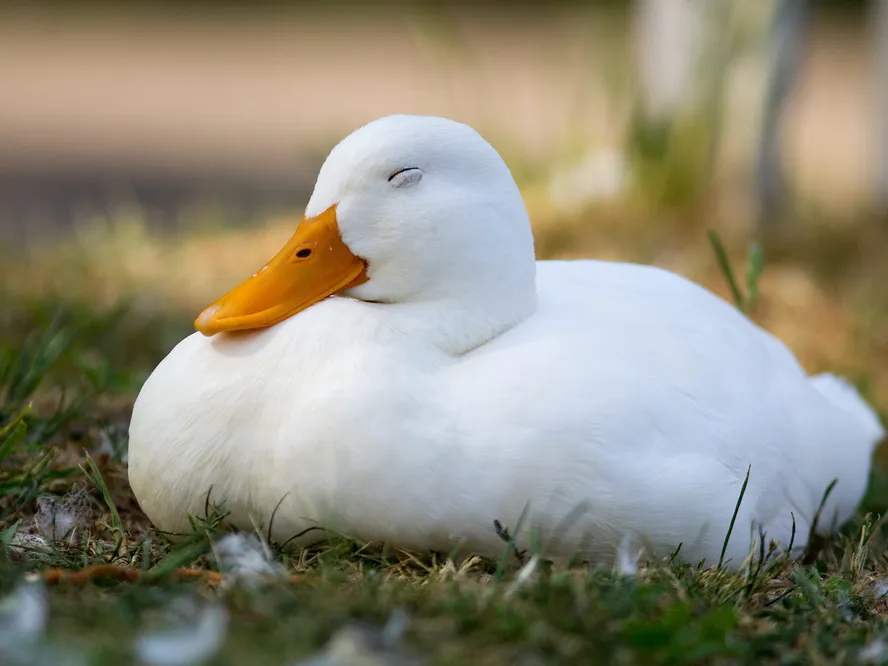Ducks are among the most familiar and beloved birds worldwide, whether spotted in local ponds, farms, or as wild migratory species. One common question people have is, “How long do ducks live?” The lifespan of a duck can vary depending on the species, environment, and overall care. In this article, we will delve into the factors that influence a duck’s lifespan, discuss the lifespan of popular duck species, and share tips to help domestic ducks live longer, healthier lives.
The lifespan of a duck can range from 5 to 20 years, depending on various factors.

Average Lifespan: Wild ducks typically live between 5 to 10 years.
Challenges: Their lifespan is often shortened due to predators, diseases, harsh weather, and food scarcity.
Average Lifespan: Domestic ducks, with proper care, can live between 10 to 15 years.
Factors for Longevity: Access to veterinary care, balanced diets, and predator protection.
Some ducks have exceeded expectations:
The oldest known domestic duck lived for 20 years.
Wild ducks have also been documented living over 15 years in favorable conditions.
Wild Lifespan: 5 to 10 years.
Domestic Lifespan: Up to 15 years.
Mallards are one of the most common species and the ancestors of many domestic breeds.
Lifespan: 8 to 12 years.
Pekin ducks are popular farm ducks known for their white feathers and gentle nature.
Lifespan: 10 to 20 years.
Known for their unique red facial markings and quiet demeanor.
Lifespan: 8 to 12 years.
These upright, fast-moving ducks are known for their prolific egg-laying.
Lifespan: 4 to 8 years in the wild.
Wood ducks prefer nesting near wooded wetlands and are known for their striking colors.
Wild ducks face constant threats from predators such as foxes, raccoons, hawks, and domestic pets.
Protecting domestic ducks with secure enclosures can significantly reduce this risk.
Wild Ducks: Depend on natural diets, such as insects, aquatic plants, and small fish.
Domestic Ducks: Require a balanced diet of grains, vegetables, and formulated duck pellets to ensure proper nutrition.
Ducks living in clean, predator-free environments have a higher chance of living longer.
Access to fresh water for swimming and foraging helps maintain their mental and physical well-being.
Ducks can suffer from illnesses like bumblefoot, respiratory infections, and parasitic infestations.
Regular health check-ups and vaccinations for domestic ducks help prevent common diseases.
Ducks bred for meat or egg production often have shorter lifespans due to genetic selection for rapid growth.
Heritage breeds tend to live longer due to their hardiness and natural resilience.
Build a secure coop or enclosure to protect ducks from predators and harsh weather.
Ensure there is enough space for ducks to roam, forage, and swim.
Feed ducks high-quality pellets supplemented with fresh vegetables and occasional fruits.
Avoid feeding harmful foods like bread, chocolate, or salty snacks.
Regularly clean water sources, bedding, and food dishes to prevent bacterial growth.
Fresh, clean water for drinking and bathing is essential to their hygiene.
Observe ducks daily for signs of illness, such as lethargy, loss of appetite, or unusual feather loss.
Contact a veterinarian experienced with birds if health concerns arise.
| Type of Duck | Average Lifespan (Wild) | Average Lifespan (Domestic) |
|---|---|---|
| Mallard Duck | 5 to 10 years | Up to 15 years |
| Pekin Duck | N/A | 8 to 12 years |
| Muscovy Duck | 7 to 10 years | 10 to 20 years |
| Indian Runner | N/A | 8 to 12 years |
| Wood Duck | 4 to 8 years | Rarely kept as domestic pets |
Yes, some well-cared-for domestic ducks, particularly Muscovy ducks, can live up to 20 years.
Wild ducks face more environmental challenges, including predators, harsh climates, and food scarcity.
A healthy duck has bright eyes, smooth feathers, and an active, social demeanor. Regular bathing and preening also indicate good health.
In general, male and female ducks have similar lifespans, but females may experience more stress during breeding seasons.
The oldest recorded domestic duck lived for 20 years, which is an extraordinary achievement for any waterfowl.
The lifespan of a duck depends on a combination of species, environment, and care. While wild ducks often face natural threats that limit their lifespan, domestic ducks can live much longer with proper care, a balanced diet, and a secure habitat. Understanding the needs of different duck species can help owners provide an environment that promotes longevity. By taking proactive steps to ensure your ducks’ health and safety, you can help them lead long, happy lives.
animal tags: ducks
We created this article in conjunction with AI technology, then made sure it was fact-checked and edited by a Animals Top editor.